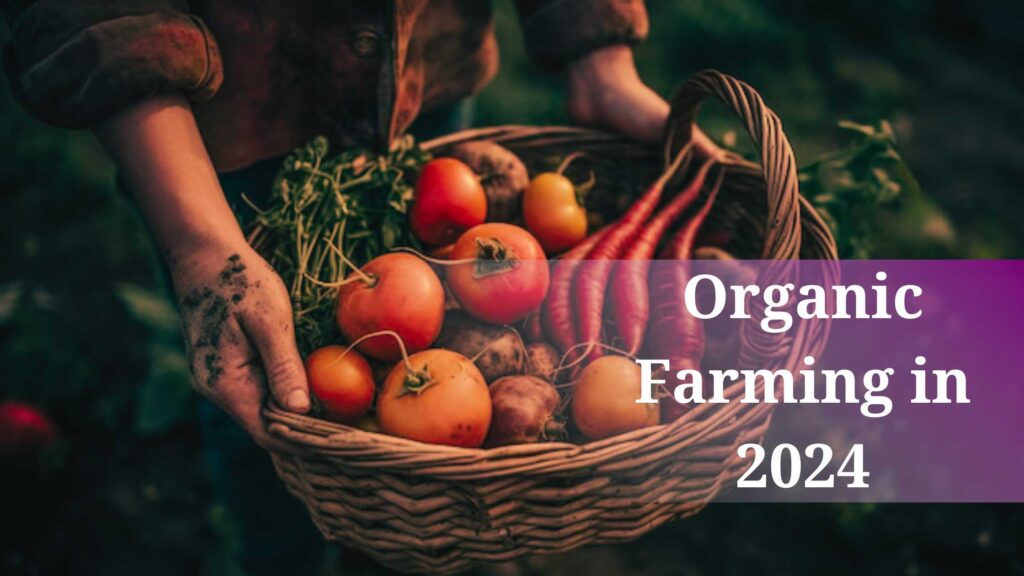Introduction:
As we stand at the threshold of 2024, the agricultural landscape is undergoing a transformation. With an increasing global awareness of environmental sustainability and a growing concern for the impact of conventional farming practices, organic farming is emerging as a beacon of hope for a healthier and more sustainable future. In this blog post, we will explore the multifaceted vision for organic farming in 2024 and the key factors contributing to its growth and success.
Regenerative Agriculture:
In the vision for 2024, organic farming goes beyond avoiding synthetic pesticides and fertilizers. It embraces regenerative agricultural practices that improve the health of the soil, enhance biodiversity, and mitigate climate change.
Techniques such as cover cropping, crop rotation, and agroforestry are employed to regenerate the soil, creating a more resilient and sustainable ecosystem.
Technology Integration:
The future of organic farming is intertwined with cutting-edge technology. Farmers are leveraging tools like precision farming, drones, and smart sensors to optimize resource use, monitor crop health, and improve overall efficiency.
These technologies enable organic farmers to make informed decisions, reduce waste, and increase yields, making organic farming a viable and competitive option in the agricultural industry.
Local and Sustainable Supply Chains:
In 2024, the organic farming movement extends beyond the farm, reimagining the entire supply chain. Consumers are demanding transparency and traceability in their food sources.
Organic farmers are collaborating with local markets and adopting sustainable packaging practices to reduce the carbon footprint associated with transportation and packaging. This emphasis on local and sustainable supply chains fosters a stronger connection between farmers and consumers.
Soil Health as a Priority:
The health of the soil is paramount in organic farming. In the vision for 2024, farmers are placing a greater emphasis on building and maintaining soil health. Through the use of compost, cover crops, and reduced tillage, organic farmers are preserving the fertility of the soil and sequestering carbon, contributing to climate change mitigation. Healthy soils translate to healthy crops and, ultimately, healthy consumers.
Educating and Empowering Farmers:
A key aspect of the vision for organic farming in 2024 is the widespread education and empowerment of farmers. Training programs, workshops, and online resources are equipping farmers with the knowledge and skills needed to transition from conventional to organic practices successfully.
Government incentives and support are further encouraging farmers to make the shift, creating a community of empowered and environmentally conscious agriculturalists.
Climate-Resilient Crops and Adaptive Practices:
In the organic farming vision for 2024, climate change is acknowledged as a pressing reality. Organic farmers are actively working towards building resilience in their crops through the cultivation of climate-resilient varieties and the implementation of adaptive practices.
This forward-thinking approach ensures the stability of organic farming and contributes to global efforts in climate change adaptation.
Collaborative Research and Innovation:
The vision for organic farming in 2024 is characterized by collaborative research and innovation. Scientists, farmers, and policymakers are working together to develop new and improved organic farming techniques.
This collaborative approach fosters a dynamic exchange of knowledge, leading to the continuous improvement of organic farming methods.
Accessible Organic Food for All:
Efforts are being made to make organic produce more accessible to a broader demographic. Initiatives to reduce the cost of organic farming inputs are underway, making organic produce more competitively priced.
Educational programs and community outreach efforts are raising awareness about the benefits of organic food, demystifying misconceptions, and making healthier food choices accessible to all socioeconomic groups.
Circular Economy in Agriculture:
Organic farming in 2024 is an integral part of a circular economy. Waste is minimized, and the principles of reduce, reuse, and recycle are embedded in every aspect of the farming process.
Circular economy practices extend to the utilization of by-products for energy generation and the incorporation of livestock in integrated farming systems, creating a closed-loop, sustainable model that minimizes environmental impact.
Global Collaboration for Sustainable Agriculture:
The vision for 2024 recognizes that the challenges facing agriculture are global, requiring international collaboration. Farmers, policymakers, and organizations from around the world are coming together to share best practices, address common challenges, and establish global standards for organic farming. This collaborative spirit ensures a united front in promoting sustainable agricultural practices on a global scale.
Conclusion:
In the envisioned landscape of 2024, organic farming is a tapestry woven with threads of sustainability, innovation, and collaboration. It goes beyond the confines of individual farms and transcends the boundaries of nations.
Organic farming is not just an agricultural practice; it is a mindset, a movement, and a commitment to a better and more sustainable future for our planet. As we move forward, embracing the vision for organic farming outlined here, we sow the seeds of resilience, sustainability, and harmony with the natural world, reaping benefits for generations to come.

